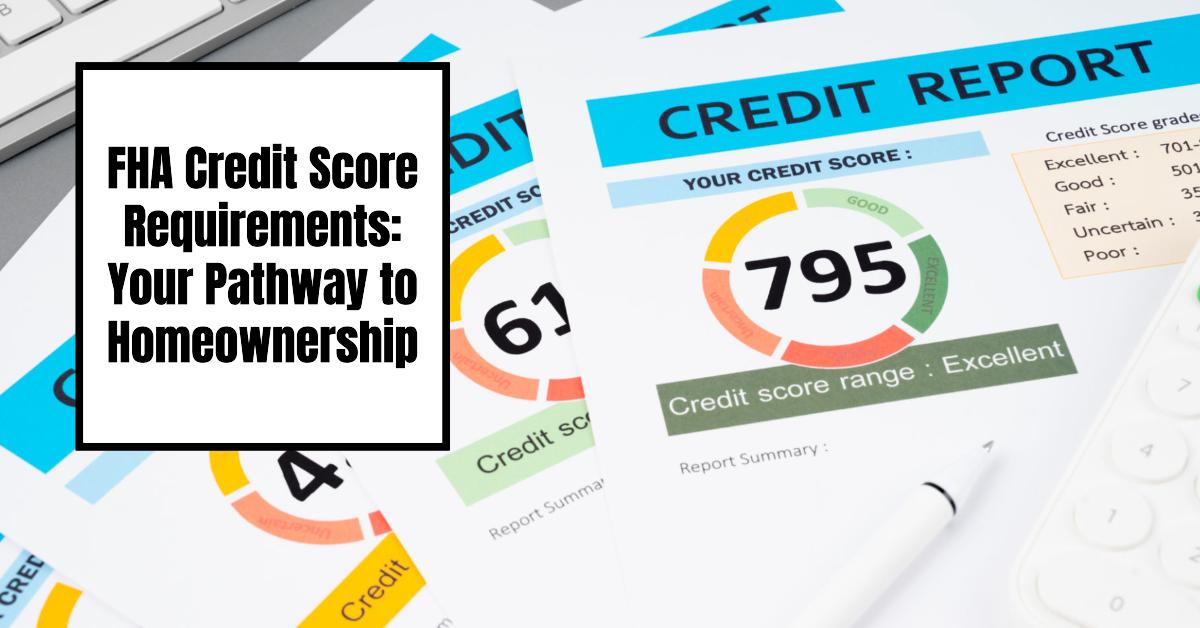Dreaming of owning your own home, but worried about your FHA credit score requirements? Don't let credit concerns hold you back! Securing a mortgage with a less-than-perfect credit history can feel like scaling a mountain, but it's definitely achievable, especially with an FHA loan. Let's unravel the mysteries surrounding FHA credit score requirements and light your path toward homeownership.
Navigating FHA Credit Score Requirements
What is an FHA Loan, and Why is it a Game-Changer?
Before we dive into the nitty-gritty of credit scores, let's clarify what makes FHA loans special. Backed by the Federal Housing Administration, these loans are designed to make homeownership accessible to a wider range of borrowers, including first-time buyers and those with less-than-perfect credit.
Here's the gist:
- Lower Down Payment: Say goodbye to the daunting 20% down payment typically required for conventional loans! FHA loans can be secured with as little as 3.5% down. Imagine finally having enough saved for that dream home!
- Flexible Credit Requirements: This is where FHA loans truly shine. They are more forgiving than conventional loans, welcoming borrowers with credit scores as low as 500 (more on this later!).
- Competitive Interest Rates: Don't let the lower down payment fool you! FHA loans often come with competitive interest rates, making your monthly payments more manageable.
The Million-Dollar Question: What's the Minimum Credit Score for an FHA Loan?
Now, let's address the elephant in the room – the minimum FHA credit score requirements. Here's the breakdown:
- 580 or Higher: This is the magic number for the lowest possible down payment of 3.5%.
- 500-579: Don't despair if your score falls within this range! You're still eligible for an FHA loan, but be prepared for a slightly higher down payment of 10%.
Remember: These are just the minimum requirements. Lenders may have stricter standards and consider other factors beyond your credit score, such as:
- Debt-to-Income Ratio (DTI): This measures your monthly debt payments against your gross monthly income. A lower DTI demonstrates good financial health.
- Employment History: Lenders like to see stability. A consistent work history reassures them of your ability to repay the loan.
- Cash Reserves: Having some savings leftover after closing costs and the down payment showcases financial responsibility and provides a safety net for unexpected expenses.
Decoding Your Credit Score: What Lenders Look For
Ever wondered how your credit score is calculated? It's like a financial report card that reflects your creditworthiness.
Here's a peek behind the curtain:
- Payment History (35%): This is the most significant factor! Paying bills on time demonstrates financial responsibility.
- Amounts Owed (30%): This refers to your credit utilization ratio – the amount of credit you're using compared to your total available credit. Keeping your balances low is key!
- Length of Credit History (15%): A longer credit history generally signifies greater financial experience and responsibility.
- Credit Mix (10%): Having a mix of credit accounts (e.g., credit cards, installment loans) demonstrates responsible credit management.
- New Credit (10%): Opening too many accounts in a short period can negatively impact your score.
Boosting Your Score: Tips for FHA Loan Success
Is your credit score not quite where you'd like it to be? Don't worry, it's not set in stone!
Here are some proven strategies to improve your creditworthiness:
- Check Your Credit Report: Order free copies of your credit report from all three bureaus (Equifax, Experian, and TransUnion) at AnnualCreditReport.com. Review them carefully for errors and dispute any inaccuracies immediately.
- Pay Bills on Time: This is crucial! Set reminders, use autopay, or explore other methods to ensure timely payments.
- **Reduce Debt: **Focus on paying down high-interest debt first, such as credit cards, to improve your credit utilization ratio.
- Avoid Opening New Credit Accounts: Every new credit application can result in a hard inquiry, potentially lowering your score.
- Become an Authorized User: If you have a trusted friend or family member with excellent credit, ask if they'd consider adding you as an authorized user to their account. This can give your score a positive boost!
Don't Let Credit Myths Hold You Back!
The world of credit scores is often shrouded in myths and misconceptions. Let's debunk some common ones:
Myth: I need perfect credit to qualify for a mortgage.
Fact: False! FHA loans are designed for borrowers with a range of credit histories, even those with scores as low as 500.
Myth: Checking my credit score will hurt it.
Fact: Not true! Checking your own credit score is considered a “soft inquiry” and does not impact your score.
Myth: Closing a credit card will improve my credit score.
Fact: It's actually the opposite! Closing a credit card can shorten your credit history and increase your credit utilization ratio, potentially harming your score.
Embrace the Journey to Homeownership!
While navigating FHA credit score requirements might seem daunting, remember that knowledge is power! By understanding the factors influencing your creditworthiness and taking proactive steps to improve your score, you can confidently pursue your homeownership dreams. Don't let credit concerns hold you back – unlock the door to your future with an FHA loan!
Recommended Read:




